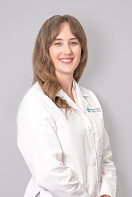These Tests Could Save Your Life
May 5, 2023
 May is Women’s Health Month, which makes it the perfect time to brush up on the basics.
May is Women’s Health Month, which makes it the perfect time to brush up on the basics.
Dr. Eden Yelverton, an OB/GYN at Lakewood Ranch Medical Center, is here to share the facts.
According to the Centers for Disease Control and Prevention, approximately one in eight women in the United States will be diagnosed with breast cancer during their lifetime. That’s 245,000 diagnoses each year.
Next to breast cancer - uterine, ovarian and cervical cancers are among the most common in women. In fact, the Centers for Disease Control and Prevention reports that almost 100,000 U.S. women are diagnosed with some form of gynecological cancer each year. The risk for certain diseases and cancers increases with age, which is why preventive screening can be essential.
“Both cervical cancer and breast cancer screening are very important,” says Dr. Yelverton. “Both forms of screening are necessary for detecting cancerous and precancerous cells at an early stage.”
Cervical Cancer Screening
Perhaps one of the earliest routine tests a woman should have, “Cervical cancer screening involves the Pap test, HPV testing, or both (co-testing). Screening can help decrease both the incidence and mortality of cervical cancer,” Dr. Yelverton adds.
The following testing should start at or around 21 years of age:
Pap Test
- Used to detect precancerous and cancerous cells in the cervix.
- Women ages 21 to 29 should have a Pap test every three years. Women ages 30 to 65 may have a Pap test every three years OR an HPV test every five years. Having both Pap and HPV testing every five years is also an option.
- For women who have been treated for precancer, continue Pap test screening for 20 years after treatment.
The results of the Pap test may require follow-up testing.
Breast Cancer Screenings
“The mammogram has been shown to reduce advanced breast cancer as it can reveal cancer at an earlier stage, and it also has been found to decrease mortality from breast cancer. The recommended age to start having mammograms is age 40 and should continue at a frequency of every one to two years,” says Dr. Yelverton.
Alongside at-home breast examinations, the following screenings are recommended for women ages 40 and above, according to the CDC.
Mammogram
- X-ray of the breast that can detect tumors or other cancerous tissue.
- Women, who are at average risk, should get a mammogram every two years, unless advised otherwise by a doctor.
3D Mammogram
- Uses multiple combined X-ray images to create a 3D image of the breast.
- Typically used for women who have no signs or symptoms.
Breast Magnetic Resonance Imaging (MRI)
- Uses magnets and radio waves to create images of the inside of the breasts.
- Typically used for those with dense breast tissue or women at high-risk for breast cancer.
Alongside mammograms and breast MRIs, practicing regular at-home breast exams can also be helpful. That way, you’re able to stay informed and promptly report any changes or abnormalities to your physician.
The Breast Health Center at Lakewood Ranch Medical Center is fully equipped to offer advanced screening and diagnostic services and is designated by the American College of Radiology as a Breast Imaging Center of Excellence.
Other Recommendations
“Breast and cervical cancer are important screening tests, but they’re not the only ones. A visit with an OBGYN or primary care provider annually gives women, not only access to cervical and breast cancer screening, but screening for osteoporosis, hypertension, urinary continence, sexual health, colon cancer, anxiety and depression,” she says.
Individualized Care
If healthcare screening recommendations seem overwhelming, Dr. Yelverton advises women to take a deep breath.
“If a woman 30 years or older has a Pap test with HPV testing and the results are normal for both, then the next screening can usually take place in five years. This is due to the thought that most healthy women can clear an HPV infection on their own, and if tested too often, it could lead to unnecessary steps being taken. However, if having an annual Pap test gives a woman peace of mind, that can also be arranged on an individual basis.”
Care and Compassion, Every Step of The Way
The OB/GYN team at Lakewood Ranch Medical Center specializes in the diagnosis, treatment and management of gynecologic conditions, maternity and women’s general health. The Women’s Center is a space dedicated to providing women with peace of mind at all ages and stages.
About Eden Yelverton, MD

Dr. Eden Yelverton is a board certified obstetrician and gynecologist. She completed her medical degree at the University of Mississippi School of Medicine in Jackson, Mississippi. Her residency in obstetrics and gynecology was completed at Atrium Health, Carolinas Medical Center in Charlotte, North Carolina. She cares for the healthcare needs of women through all phases of life. She is a member of the American Association of Gynecologic Laparoscopists and American Congress of Obstetrics & Gynecology.
Lakewood Ranch Medical Group OB/GYN Clinic 6310 Health Park Way, Suite 200 Lakewood Ranch, FL 34202 Phone: 941-348-1144
SOURCES:
